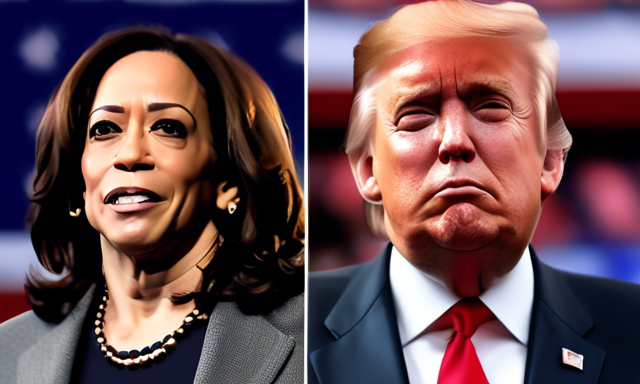Overview of Recent Political Developments 🌍
The recent debate between Vice President Kamala Harris and former President Donald Trump on September 10 has significantly influenced the financial landscape, particularly in prediction markets. The prevailing sentiment suggests that Harris outperformed Trump, a notion supported by data from popular prediction platforms.
Prior assessments indicated that Trump had established a sizeable advantage in these markets, but new information demonstrates a shift in dynamics following the debate.
Insights from Prediction Markets 📊
Before the debate, data indicated that Trump had a 53% probability of winning from September 4 to 6. During this same interval, Harris’s chance dipped to about 45%. However, fast forward to September 11, new data revealed by a well-known prediction market indicates that both candidates now stand at an equal 49% likelihood of victory. This change may directly correlate with Harris’s strong performance in the recent debate.
Understanding How Prediction Markets Operate 🔍
Prediction markets function as trading platforms where participants place bets on various outcomes. Traders engage in this marketplace by buying shares tied to the likelihood of certain events, effectively wagering on outcomes they believe will occur.
At present, a “yes” share for either candidate holds a value close to $0.49. If a candidate is elected, investors with “yes” shares will earn a profit of $0.51 per share. This setup presents advantageous betting odds for individuals speculating on either candidate’s success.
The Harris-Trump Debate Analysis ⚔️
The initial debate between Kamala Harris and Donald Trump featured a dynamic back-and-forth dialogue that lasted 90 minutes, covering a spectrum of critical issues. The interaction saw both candidates making pointed attacks on each other’s records and policies.
Harris took a firm stance against Trump, highlighting his legal challenges and the administration’s handling of the pandemic, while Trump concentrated his arguments on inflation and immigration, underlining areas where the current administration has faced scrutiny. An unusual moment arose during the debate when Trump made dubious assertions about migrants allegedly consuming pets in Ohio.
Key topics such as abortion rights, economic strategies, and international confrontations were pivotal in the debate. Harris emphasized her role as an advocate for the middle class, while Trump cast doubt on her policies and originality. Both candidates, however, fell short of providing substantial solutions to global crises, including the situations in Gaza and Ukraine.
The discourse also ventured into sensitive areas like race, crime statistics, and the integrity of elections, underscoring the existing partisan rifts. A notable post-debate development was the endorsement of the Democratic ticket by pop icon Taylor Swift, which may serve to enhance Harris’s campaign visibility. Analysts are now reflecting on how the debate might reshape the landscape of the presidential race, as prediction markets continue to evolve.
Current Trends and Market Reactions 📈
The debate’s immediate aftermath has sparked discussions about the implications for both candidates in the upcoming election. As voters reflect on the topics addressed and the performance exhibited, many are keenly observing how these events translate into shifting dynamics within prediction markets.
This year, the impact of public endorsements, debate performances, and media narratives will undoubtedly play a crucial role in shaping voter sentiments. With both candidates pivoting to address the concerns raised during the debate, the race remains competitive and closely monitored by analysts and political enthusiasts alike.
Final Thoughts 🔥
The recent interactions and performances can have cascading effects as we move closer to the elections. As a crypto reader, staying informed about the developments in prediction markets is essential for understanding broader trends. The highly charged debates highlight the contrasting strategies and policies of each candidate, which can influence their respective positions in not just the election, but also the financial realms affected by these shifting public perceptions.





 By
By
 By
By
 By
By
 By
By

 By
By